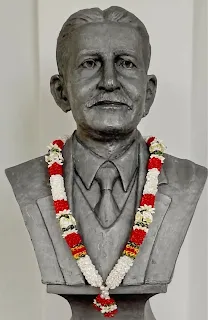Seven Years in Tibet (1997)
Director: Jean-Jacques Annaud
Director: Jean-Jacques Annaud
(Based on Heinrich Harrer's book with the same name)
Similar to the internment camps established in the USA for German and Japanese migrants during the First and Second World Wars, India had comparable camps. Numerous German workers and even alpine climbers from Austria were detained in various camps around Ahmedabad and Dehradun. One notable individual was Gustav Hermann Krimbiegel, an extraordinary gardener credited with creating royal gardens across India. Krimbiegel was a German botanist who migrated to Britain in 1888. He began his apprenticeship at Kew Gardens and was subsequently recommended to work in the garden of the Maharaja of Baroda. After witnessing his remarkable gardening skills, he was commissioned by other princely states. He is recognised for his development of Lalbagh in Bangalore, Brindavan in Mysore, and many others. In addition to his horticultural achievements, he is also known for introducing new seeds from abroad to India, along with innovative architectural designs, creating a distinctive Indian aesthetic for gardens.When World War II broke out, Krimbiegel, due to his German origins, was confined to an internment camp as an enemy of the British Empire. With the assistance of King Baroda, who was at the time the wealthiest man in the world, special arrangements were made with the Empire for his release. Krimbiegel is credited with introducing innovative agricultural practices that enhanced irrigation, supported local economies, conducted tree censuses, and infused European techniques into traditional Indian gardening.
 |
| Gustav Hermann Krimbiegel (1865-1956) https://medium.com/@andrewabranches/ gustav-hermann-krumbiegel-b6bdb9ad28c0 |
What happened afterwards was a life-changing experience for Harrer and his fellow climber, Peter Aufschnaiter. After receiving divorce papers from his wife and a cold letter from a son he had never met, Harrer chose to stay in Tibet to embark on a journey of self-discovery. Coincidentally, he had a chance encounter with the young Dalai Lama in Lhasa, becoming the Dalai Lama's teacher and close confidante.
The invaluable lesson that is taught to us from Harrer's life experience is this. Isolation opens our inner eye. Stranded in the middle of the gargantuan forces of Nature, one is humbled to come to terms with his vulnerability. Ego is crushed, and all he sees in front of him is his mortality and the life that passed him by. It is at this opportune time that one can make amends. By being respectful and curious, one can be a good student. Watching this film and viewing Zakir Naik's vile video, one can understand how wrong and close-minded Naik is in spreading his deluded 'wisdom'.






